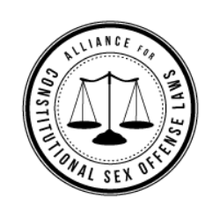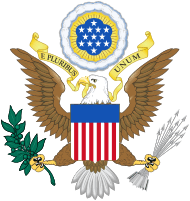Alliance for Constitutional Sex Offense Laws
 | |
| Type | Non-profit organization |
|---|---|
| Purpose | Protecting the Constitution by restoring the civil rights of registrants |
| Headquarters | Los Angeles, California |
President | Janice Bellucci |
Vice President | Chance Oberstein |
| Website | all4consolaws.org/ |
| This article is part of a series on the |
| Sex offender registries in the United States |
|---|
 |
|
Legislation
|
|
Constitutionality |
|
Social issues
|
Alliance for Constitutional Sex Offense Laws (ACSOL) is a civil rights, legal reform, and support organization, with offices in Los Angeles and Sacramento, that is dedicated to protecting the Constitution by restoring the civil rights of registrants (also known as “sex offenders”) and their families. ACSOL was formerly known as California Reform Sex Offender Laws (CA RSOL).
Purpose
ACSOL advocates for registrants' constitutional rights and for legislation that is based on empirical evidence instead of fear and panic. The organization is dedicated to restoring the civil rights of those convicted of sex offenses and their families. In order to achieve this objective, ACSOL initiates and supports education, legislation and litigation.[1] It aims to educate law-makers and public that registrants are diverse group of individuals; that contrary to popular belief, general recidivism rate of 5% over 5 years[2] is the second lowest of all offender groups;[3] and that residency restrictions and public notification have no demonstrable effect on recidivism and might actually undermine public safety,[4] thus making onerous restrictions and stigmatizing effect of public sex offender lists unfair and unfounded when applied broadly to all offenders without considering the individual risk and underlying facts of individual cases.
ACSOL condemns all sexual offending, but holds that current sex offender registration laws and policies that paint all sex offenders with one broad brush, without considering actual facts of individual cases and the risk posed by the offender, are counterproductive, waste law enforcement resources and taxpayers money, while causing needless harm to many registrants and their family members. ACSOL believes that the money spent on further punishing registrants who have served their court imposed sentence, should have been used for prevention, healing, and rehabilitation.[1]
Lawsuits
ACSOL has participated in legal battles challenging local Halloween ordinances,[5] proximity restrictions and residency restrictions aimed at registrants in federal court across the state of California.[6][7][8] During 2014 ACSOL participated in more lawsuits involving more than 30 municipalities.[9] Due to the Halloween lawsuits, registrants in California are no longer required to post a sign on the front door of their residence on that holiday. This includes a settlement reached with the California Department of Corrections (CDCR) in August 2016 in which CDCR agreed not to require registrants on parole to post the Halloween signs.
Due to the proximity restrictions lawsuits, registrants in California are now allowed to visit public and private places throughout the state without fear of arrest. In June 2015, ACSOL began a series of federal lawsuits challenging residency restrictions in the state of California. As of September 2016, a total of 12 lawsuits have challenged residency restrictions in 11 different cities. Of that total, five lawsuits have already resulted in either the repeal or significant revision of the city’s restrictions and settlements are pending in an additional three cities.
The most significant litigation in which ACSOL has participated thus far is a challenge to the International Megan’s Law (IML), passed by Congress and signed into law by the President, in February 2016. A lawsuit was filed in federal district on February 9, 2016, and is pending in the United States District Court, Northern District of California. The IML authorizes the Executive Branch to send notices to foreign countries when registrants convicted of an offense involving a minor travel overseas. The IML requires the State Department to add a conspicuous identifier to the passports of registrants. The only countries known to have added such identifiers to the passports of their citizens are Nazi Germany and Communist Russia.
See also
References
- 1 2 "About Us - ACSOL". Alliance for Constitutional Sex Offense Laws, Inc.
- ↑ Zgoba, Kristen; Miner, Michael; Knight, Raymond; Letourneau, Elizabeth; Levenson, Jill; Thorton, David. "A Multi - State Recidivism Study Using Static - 99R and Static - 2002 Risk Scores and Tier Guidelines from the Adam Walsh Act" (PDF). National Institute of Justice.
- ↑ Langan, Patrick A.; Schmitt, Erica L.; Durose, Matthew R. (2003). "Recidivism of Sex Offenders Released from Prison in 1994" (PDF). U.S. Department of Justice.
- ↑ "Sex Offender Registration and Notification". Sex Offender Management Assessment and Planning Initiative. Office of Justice Programs.
- ↑ Case, Stephanie (September 19, 2013). "City of Orange Sued Over Sex Offender Halloween Restrictions". KTLA 5.
- ↑ Blow, Steve (17 July 2014). "We can do better on sex offender laws". The Dallas Morning News. Retrieved 14 November 2014.
- ↑ Belluci, Janice (21 July 2013). "CA RSOL Challenges El Dorado County Sex Offender Ordinance". In Eldorado County News. Retrieved 14 November 2014.
- ↑ Howes, Rebecca (April 24, 2014). "Attorney files sex offender lawsuit against Lompoc". Lompoc Record. Retrieved 14 November 2014.
- ↑ Johnson, Shea (Oct 21, 2014). "County sued over sex offender ordinance". Daily Press. Retrieved 14 November 2014.